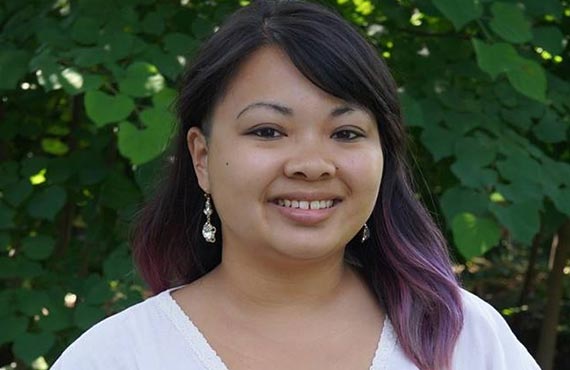Khoury News
New faculty member Alexandra To designs social technologies for coping with racism
Photo provided by Alexandra To. For assistant professor Alexandra To, racial justice isn’t just something she researches or writes about—it’s fundamental to her teaching at Khoury College of Computer Sciences […]


Photo provided by Alexandra To.
For assistant professor Alexandra To, racial justice isn’t just something she researches or writes about—it’s fundamental to her teaching at Khoury College of Computer Sciences and the College of Arts, Media and Design (CAMD).
“A lot of my racial justice training uses theories like critical race theory and intersectionality,” To said. “So I try to bring those conversations into my classroom spaces from that academic perspective, to show my students that this is just as important as the other dominant theories that we’re covering in human-computer interaction.”
Critical race theory examines race in our society and culture, while intersectionality studies the connection of race, gender or other identities in terms of oppression and privilege. The field of Human-Computer Interaction, or HCI, studies the design of technology and its interactions between humans.
For To, this means her research at Northeastern spans Khoury College and CAMD, using HCI to design social technologies and create games to help those in marginalized communities.
Coming from one of the few Asian American families in a rural town in Michigan, To grew up with race and culture as a constant in her life. Racial justice has been her passion, and the focus of her research, since her time as a Symbolic Systems undergraduate and master’s degree student at Stanford University.
Recently, Professor To won double recognition from CSCW 2020 for her paper, “‘They Just Don’t Get It’: Towards Social Technologies for Coping with Interpersonal Racism.” Garnering both Best Paper and Contributions to Diversity and Inclusion awards at the October virtual conference, her paper presents an inquiry into coping tactics with interpersonal racism. In the study, To interviewed 14 adults who had faced racism, asking them about their experiences to see how they and others cope with interpersonal racism.
“We know that interpersonal racism is pervasive and constant, happening every day,” To explained. “There are the more extreme versions that many of us are aware of, but there are also really subtle versions that people of color just have to deal with all the time that don’t even always go acknowledged,” To said. In her study, To said she focused on “understanding what people who can cope with this every day are doing already right now that is beneficial to their coping, that is helping either themselves or their community in processing and dealing with these issues.”
Using an asset-based approach, in which a researcher finds points of strength to then design supports that enhance those strengths, To found that uncertainty was a driver of behaviors for coping with interpersonal racism.
At the beginning of the project, To and her research team already knew the value of social support, yet they didn’t know much about what kinds of social support or how people find it when they need a coping mechanism for dealing with racism. Explained To, “In the simplest case, uncertainty meant a person would try to verify the nature of the experience.” She suggested an example of a hypothetical person: “‘I was at work, and someone made this comment that I felt was inappropriate, so let me go talk to someone else who might have had this experience and verify if that was racism.’”
This is not Professor To’s first time working with the concept of uncertainty: she previously designed educational video games for communities underrepresented in STEM, with the goal of not only eliminating uncertainty, but also encouraging curiosity—which she does in her classroom now.
“Let’s try to treat uncertainty as something that is exciting, that we have the tools capable of reducing and resolving those uncertainties to a comfortable level, while still learning and engaging with something that we’re excited about,” To said.
Professor To joined the Northeastern faculty in May 2020, excited to pursue her research interests while collaborating with undergraduate students, about whom she cares a lot. Wanting to make sure her students understand how technology affects issues of justice marginalization, she promotes equity in her classrooms so students feel as though it’s safe to participate in class discussions. It is important to To that her students respect each other, which means pronouncing each other’s names correctly and using each other’s pronouns correctly.
“There was a point in time, in computer science especially, where I was actively encouraged to treat [computer science and racial justice] as separate, where computer science is technical or objective and sort of outside of this realm of social issues,” To said. She added, “Now that’s not the case.”
With a vision that goes beyond her research agenda, To said she wants to eliminate the misunderstandings of racial justice and critical race theory, e.g., as the White House banned government agencies from using critical race theory in conversations or training about diversity and inclusion. The theory is a compelling, useful framework that helps us understand society and culture in relation to the law, race, and power. “There are a lot of things that the executive order gets wrong about what critical race theory says,” asserted To.
Speaking of the theory’s importance to her own work, Professor To added, “I do racial justice work out of care and love for my communities. If I didn’t think that my communities could be better or could change for the better, I wouldn’t put all this time and labor and effort I put in to provide tools to people to engage with racial disparity or racial oppression.”